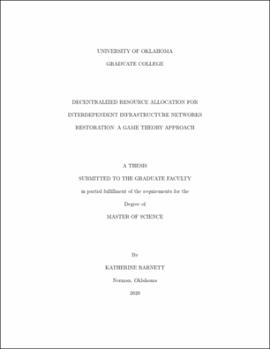| dc.contributor.advisor | Mohebbi, Shima | |
| dc.contributor.author | Barnett, Katherine | |
| dc.date.accessioned | 2020-04-21T21:37:36Z | |
| dc.date.available | 2020-04-21T21:37:36Z | |
| dc.date.issued | 2020-05 | |
| dc.identifier.uri | https://hdl.handle.net/11244/324143 | |
| dc.description.abstract | Critical infrastructures are governed by several sectors working together to maintain social, economic and environmental well-being. These infrastructures are interdependent and rely on a complex schedule of repair after a disruptive event. Decision makers seek to restore the infrastructure networks as quickly as possible while balancing time and resource constraints. Although many models focus on a centralized view for networks, rarely is there only one decision maker for the infrastructure networks, making decentralization a more realistic view. In decentralized decision-making paradigm, individual decision makers need to decide how to prioritize areas of the network and eventually improve the aggregated infrastructure systems resilience. Existing literature advocates cooperative management strategies to enhance infrastructure systems resilience. However, there is a dearth of quantitative studies analyzing resource allocation decisions considering both decentralized and cooperative aspects. In light of cooperative game theory, interdependent infrastructure systems can be modeled as coalitions of service providers pooling their resources to meet the global performance. This work relies on coalitional game theory to address decentralized resource allocation for interdependent water distribution and road networks. Coalitional game theory addresses the fair allocation of resources for nodes that surround an important area to the infrastructure and the need to decentralize the overall interdependent network. In particular, combining coalitional game theory with weighted graphs creates an order of repair for each node in the coalitions. Subsequently, the decision makers can pass information on to the master problem, reducing the complexity of the resource allocation problem for the interdependent networks. The proposed approach is applied to water distribution and transportation networks in the City of Tampa, FL. We compare the decentralized solutions to centralized solutions in different scenarios to demonstrate the feasibility of our approach for the city-scale networks. | en_US |
| dc.language | en_US | en_US |
| dc.rights | Attribution 4.0 International | * |
| dc.rights.uri | https://creativecommons.org/licenses/by/4.0/ | * |
| dc.subject | Game theory | en_US |
| dc.subject | Interdependent infrastructures | en_US |
| dc.subject | Network optimization | en_US |
| dc.subject | Resource allocation | en_US |
| dc.subject.lcsh | Infrastructure (Economics) | |
| dc.subject.lcsh | System design | |
| dc.subject.lcsh | Resource allocation | |
| dc.subject.lcsh | Game theory | |
| dc.title | Decentralized Resource Allocation for Interdependent Infrastructure Networks Restoration: A Game Theory Approach | en_US |
| dc.contributor.committeeMember | Trafalis, Theodore | |
| dc.contributor.committeeMember | Omitaomu, Olufemi | |
| dc.date.manuscript | 2020-04 | |
| dc.thesis.degree | Master of Science | en_US |
| ou.group | Gallogly College of Engineering::School of Industrial and Systems Engineering | en_US |
| shareok.orcid | 0000-0002-0496-593X | en_US |
| shareok.nativefileaccess | restricted | en_US |

